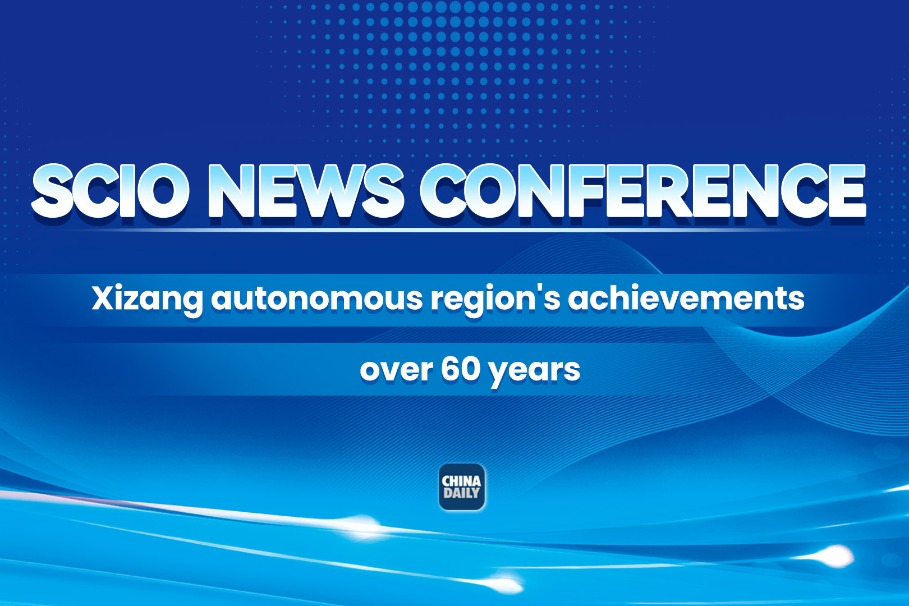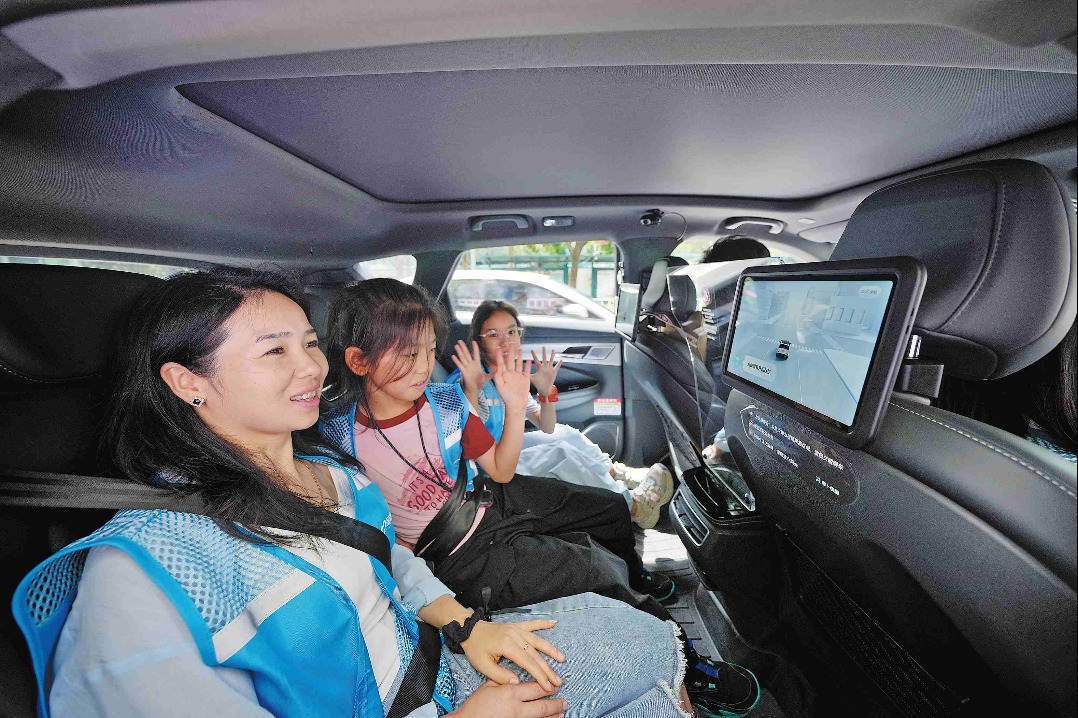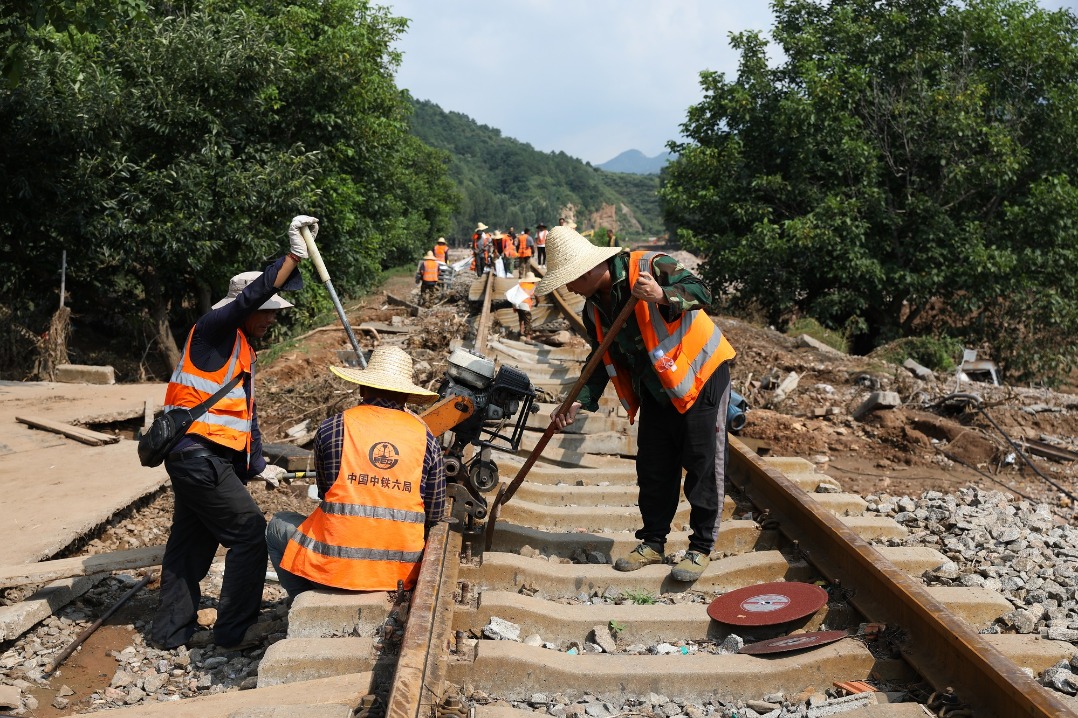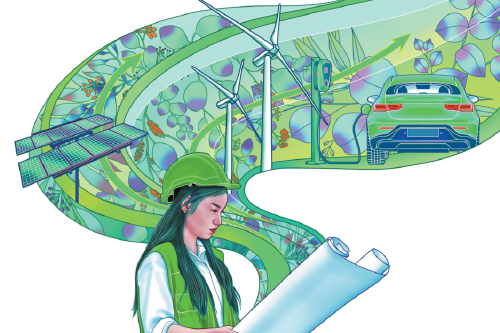Empowering AI governance
China's proposed principle of 'AI for Good' has become a focal point


Artificial intelligence is rapidly transforming global patterns of production and reshaping the distribution of power. As a result, the governance of AI has moved beyond questions of technical regulation into the institutional domain, where ethics, equity and security have emerged as central concerns. Ensuring that AI is governed "for good" has become a pressing challenge shared across the international community.
The concept of good governance, one of the cornerstones of the United Nations' Sustainable Development Agenda 2030, encompasses not only effective and orderly institutional arrangements, but also fairness, inclusiveness and accountability in the decision-making process. When extended to the realm of AI, this notion takes on broader meaning: governance should address the safety, controllability and transparency of AI systems, as well as whether the technology contributes to collective well-being, mitigates structural inequalities, and reinforces — instead of eroding — global cooperation.
In essence, global AI governance for the public good is an ongoing institutional project, grounded in multilateral coordination and cross-sectoral collaboration. It aims to ensure that AI development remains technically sound, ethically responsible and genuinely oriented toward the public interest and human welfare.
The path toward good governance remains obstructed by four enduring structural barriers that continue to hinder consensus and meaningful progress.
First, the fragmentation of governance mechanisms has significantly undermined institutional coherence. While organizations, such as the Organization for Economic Cooperation and Development, the UN Educational, Scientific and Cultural Organization and the G7, have been advancing their respective ethical principles for AI, their initiatives remain fragmented and their implementation pathways, thematic priorities and participation structures diverge. The absence of unified standards and enforceable frameworks has led to normative inconsistencies and weakened collective capacity.
Moreover, governance architectures, dominated by developed countries, often marginalize the perspectives and practical needs of developing nations, hampering mutual recognition and the interoperability of regulatory systems. This institutional disarray leads to a broader collective action dilemma.
Second, persistent technological asymmetries are deepening the digital divide between the Global North and the Global South. Core enablers of AI development — computational power, data, algorithms and skilled talent — are disproportionately concentrated in a handful of countries and tech giants. In contrast, developing countries frequently face constrained capacity-building and remain locked into dependent technological trajectories, resulting in a structural disadvantage from the outset. Further imbalances in training data ecosystems and the unidirectional flow of talent impair the Global South's ability to influence agenda-setting or contribute meaningfully to standard-setting processes. These dynamics have given rise to new forms of governance inequality, exemplified by phenomena such as algorithmic dependency and "data colonialism".
Third, asymmetries in discursive power have led to the formation of culturally-biased norms. Although multilateral declarations often adopt the rhetoric of inclusivity and universality, they tend to reflect Western ethical frameworks and liberal normative assumptions — frequently overlooking the institutional contexts and socio-technical constraints of non-Western states. Simultaneously, Western technology corporations have leveraged their dominance in algorithmic products, data architectures and platform governance to shape global narratives and export normative preferences. This dynamic has marginalized alternative epistemologies and value systems, reinforcing a deep cognitive asymmetry in global AI governance.
Fourth, mechanisms for inclusive stakeholder collaboration remain underdeveloped, with limited institutional support for meaningful multiactor engagement. While governments, enterprises, academic institutions and civil society actors have become increasingly involved, most global governance platforms continue to lack clearly defined roles, responsibilities and channels for structured interaction. Non-state actors are often relegated to advisory capacities, limiting their ability to shape policy or close feedback loops. Developing countries are especially vulnerable to marginalization in global norm-making processes. Although initiatives such as the Global Partnership on AI aim to foster inclusivity, their broad mandates and procedural inefficiencies often inhibit the formation of truly effective and coordinated governance networks.
In response to the structural tensions and institutional fragmentation that continue to hinder global AI governance, China has advanced a framework for "AI for Good" grounded on the principles of human-centered development and win-win cooperation. Through a multipronged approach encompassing capacity-building, institutional innovation, standard-setting and multi-stakeholder collaboration, China is actively contributing to the development of a governance system that combines domestic resilience with global adaptability — reflecting its commitment as a responsible global actor.
First, China is strengthening its domestic regulatory architecture while supporting the co-development and co-governance of AI in the Global South. At home, the country has steadily improved its AI governance mechanisms, exemplified by the release of key regulatory instruments such as the Interim Measures for the Management of Generative AI Services. This policy outlines a closed-loop governance framework covering model registration, risk assessment, content watermarking and accountability tracing. Regulatory sandboxes in cities such as Beijing and Shenzhen are piloting model risk classification systems and transparency labeling practices. Globally, China is leveraging mechanisms to assist developing countries in establishing AI training centers, while partnering with domestic enterprises to deliver localized talent development and open-source technology sharing — narrowing the global intelligence gap.
Second, China is advancing institutional initiatives that elevate the visibility and voice of developing countries within global AI governance platforms. It has supported the development of multi-level, cross-regional frameworks that collectively form a governance matrix composed of normative leadership, regional cooperation and issue-specific mechanisms. For instance, the Global AI Governance Initiative articulates principles such as "AI for Good "and inclusive benefit-sharing, positioning itself as a normative supplement to prevailing Western-led regulatory regimes. Simultaneously, China has deepened its digital cooperation with regions including Africa, Latin America and the Arab world to facilitate greater Global South participation in agenda-setting processes.
Third, China is promoting the global diffusion of trustworthy AI principles by integrating them into international technical standards and best practices. The White Paper on Trustworthy AI, published in 2021, outlines a governance philosophy anchored in human-centered design, risk mitigation and development-driven orientation. Through pilot projects under the Belt and Road Initiative and active engagement with international standard-setting organizations, China is working to foreground issues such as algorithmic transparency, linguistic diversity and cross-cultural interoperability — thereby enhancing its discursive influence in global standard-setting arenas.
Fourth, China is cultivating an integrated governance ecosystem that links government leadership with corporate engagement and academic input. A coordinated mechanism has emerged in which government agencies promote AI diplomacy through inter-ministerial collaboration, while companies such as Huawei and Alibaba participate in the formation of global AI norms.
Concurrently, Chinese think tanks and academic institutions are contributing to platforms such as UNESCO and the UN Economic and Social Commission for Asia and the Pacific, offering policy advice and facilitating knowledge translation. This model of "collective engagement" has allowed China to support global governance processes through technical expertise, dialogue and policy experimentation — without overtly promoting prescriptive frameworks.
As global AI governance approaches a critical inflection point — marked by escalating technological risks and a fragmented international consensus — "AI for Good" has become a focal point of institutional debate. China's response is anchored in a governance vision that balances innovation and security, foregrounds human-centered development, and promotes inclusive global cooperation. Through international initiatives, multilateral platforms and cross-border collaboration, China seeks to contribute to a shared governance framework. Looking ahead, it aspires to act as a value proponent, institutional contributor and responsible participant — helping steer global AI governance toward a future defined by equity, inclusiveness and mutual benefit.

The author is a professor at the Center for American Studies at Fudan University. The author contributed this article to China Watch, a think tank powered by China Daily.
Contact the editor at editor@chinawatch.cn.

































